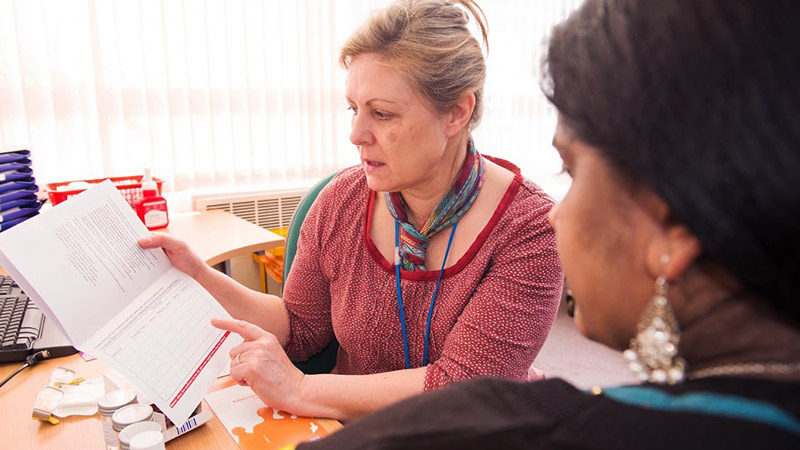Nursing Studies (Leadership in Clinical practice)
MSc or PGDip or PGCert
Key facts
Course code
MSC-NSC, PGC-NSC, PGD-NSC
Start dates
January 2024 / September 2024 / January 2025 / September 2025
Application deadline
1 August (for a September start) 1 December (for a January start)
Location
Course length
Full time: 12 months
Part time: up to 5 years for all awards
Academic level
7
Academic credits
60, 120, 180
Overview
If you are a registered nurse you can build on your practice with our MSc / PGDip / PGCert Nursing Studies. This is a flexible course where you learn as part of a collaborative community of nurses, midwives and Allied Health Practitioners (AHP)s.
We will develop your confidence as you build on your skills so you can become a leader in your field. You will develop your practice with confidence. This allows you to make effective nursing interventions knowing they are based on the best available evidence.
We have an established pathway for exceptional students to write for peer-reviewed publications. You also have the opportunity to develop your teaching skills.
Our lecturers are experienced in their specialist practice areas and maintain excellent practice links locally or across the region. They also have strong links with colleagues, organisations and institutions at national and international level.

How to apply
Entry requirements
You must:
- be a qualified nurse (equivalent to UK registered nurse) with up-to-date and current registration within your country of origin and be employed within current clinical nursing practice. You must have a minimum of one year's post-registration experience either in the UK or in your home country
- normally hold a UK first degree or equivalent overseas degree from a reputable institution. If you do not hold a first degree or equivalent, you will be required to submit an assignment which will be taken into account as part of your application
- be able to supply an academic reference that supports your potential to study at the postgraduate level. This cannot be supplied by an employer unless you work within an educational institution.
International applications
Apply using the University application portal for distance learning.
This course does not:
- lead to registration with the Nursing and Midwifery Council (NMC) in the UK
- have a practice-based component
- lead to employment within the UK while you are studying or after you have completed. (We are able to supply you with contact details of local NHS trusts when you start the course if you wish to explore these possibilities).
Terms and Conditions of Enrolment
When you accept our offer, you agree to the Terms and Conditions of Enrolment. You should therefore read those conditions before accepting the offer.
English language requirements
If your first language is not English, you must demonstrate that your level of English is appropriate for study at postgraduate level. We require an IELTS score of 6.5 overall, or equivalent.
English requirements for visas
If you need a student visa to enter the UK you will need to meet the UK Visas and Immigration minimum language requirements as well as the University's requirements. Find out more about English language requirements.
Application process
International students should apply using the University application portal for distance learning.
UK-based students should apply direct.
Tuition fees
Questions about fees?
Contact Student Finance on:
Tuition fees
Fees quoted are for the first year only. If you are studying a course that lasts longer than one year your fees will increase each year.
How and when to pay
Tuition fee instalments for the semester are due by the Monday of week 1 of each semester. Students are not liable for full fees for that semester if they leave before week 4. If the leaving date is after week 4, full fees for the semester are payable.
- For information on payment methods, please see our Make a Payment page.
- For information about refunds, please visit our Refund policy page
Additional costs
Please be aware that some courses will involve some additional costs that are not covered by your fees. Specific additional costs for this course are detailed below.
Optional costs
| Additional costs | Amount (£) |
|---|---|
It’s your responsibility to cover print / binding costs where coursework submission is required. Please note that a lot of the coursework is now submitted online. |
From £30 |
| You may choose to purchase books to support your studies. Many books on our reading lists are available via the Library, or can be purchased secondhand. | £20-60 per book |
Accommodation fees in Brookes Letting (most do not include bills) |
£94-265 per week |
Accommodation fees in university halls (bills included, excluding laundry costs) |
£122-180 per week |
Graduation costs include tickets, gowning and photography. Gowns are not compulsory but typically students do hire robes, starting at £41. |
Typically £0-200 |
Students are responsible for their own travel to and from university for classes. BrookesBus travel is subsidised for full-time undergraduate students that are on a course with a fee of £9,250 or more, or living in an Oxford Brookes hall of residence. There is an administration fee for the production of a BrookesKey. |
From £10 |
It’s your responsibility to cover print / binding costs where coursework submission is required. Please note that a lot of the coursework is now submitted online. |
From £30 |
| You may choose to purchase books to support your studies. Many books on our reading lists are available via the Library, or can be purchased secondhand. | £20-60 per book |
Accommodation fees in Brookes Letting (most do not include bills) |
£94-265 per week |
Accommodation fees in university halls (bills included, excluding laundry costs) |
£122-180 per week |
Graduation costs include tickets, gowning and photography. Gowns are not compulsory but typically students do hire robes, starting at £41. |
Typically £0-200 |
Students are responsible for their own travel to and from university for classes. BrookesBus travel is subsidised for full-time undergraduate students that are on a course with a fee of £9,250 or more, or living in an Oxford Brookes hall of residence. There is an administration fee for the production of a BrookesKey. |
From £10 |
Funding your studies
Financial support and scholarships
Featured funding opportunities available for this course.
All financial support and scholarships
Learning and assessment
We have designed the course to raise your practice to an advanced level. This will enable you to progress as a senior practitioner, educator, researcher or manager.
For the MSc you will take:
- five compulsory modules
- dissertation (triple module)
- 3 optional modules to make up the 9-module total.
For the PGDip you will take five compulsory modules (not including the dissertation) plus one optional module.
For the three module PGCert you will take the following modules:
- Mastering Professional Nursing Practice
- Evidence-based Practice
- Leadership in Health and Social Care.

Study modules
The modules listed below are for the master's award. For the PGDip and PGCert awards your module choices may be different. Please contact us for more details.
Learning and teaching
You can study all of the compulsory course modules by distance learning. Some of the modules for this course are also available on campus.
You will have access to a range of technologies such as online real-time video and audio communication tools. You will have support from a variety of staff including our librarians and learning technologists.
Assessment
Assessment methods used on this course
You will be assessed through varied methods including:
- essays
- critical reviews
- case studies
- virtual presentations.
As an MSc student you will write a dissertation on a topic of your choice.
If you choose distance learning you will receive additional materials to guide you during your studies. These include study guides and access to an interactive online learning environment and real-time classrooms.
Programme changes:
On rare occasions we may need to make changes to our course programmes after they have been
published on the website. For more information, please visit our
changes to programmes page.
